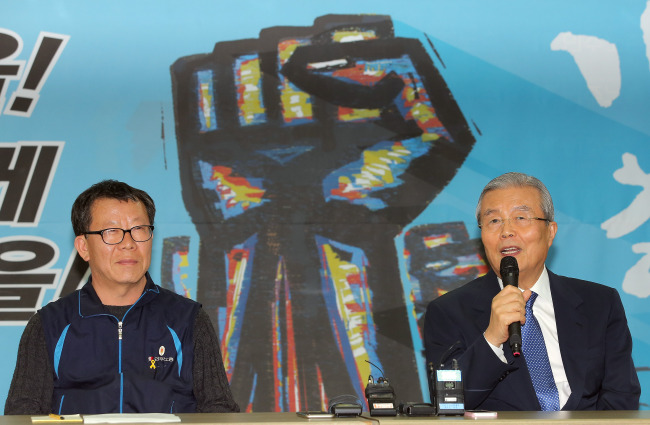Under such pressing circumstances, parties are naturally leaning toward a selective and concentrated strategy, seeking to strengthen the favor of their traditional support groups instead of eyeing new areas.
For President Park Geun-hye and the ruling Saenuri Party, such reliable proponents are mostly senior citizens groups, Christian societies and the military, including former war veterans.
“It is a matter of prime interest for the government to create more jobs for senior citizens so that they may gain confidence and live happily” the president said during her visit to a Busan senior welfare center Wednesday.
 |
President Park Geun-hye talks with elderly citizens at a senior welfare center during her pre-election visit to Busan on Wednesday. Cheong Wa Dae |
Park has often been observed as addressing elderly groups for support when facing key elections or pushing for controversial decisions.
Late last year, during an annual luncheon with the Korean Senior Citizens Association, the president reiterated her call for a state-authored history textbook, although a nationwide protest against the government-controlled revision was ongoing.
“In order for our nation to take a further leap, I believe it is crucial to properly pass on to our descendants the great history achieved by the elderly,” Park had said.
Her appeal found the right audience, as the senior group immediately responded with unwavering support.
“(Our association) will at all times stand by the president, who is ever devoted to the nation and the people,” said the KSCA chairman Lee Sim.
The president and the ruling camp have every reason to care about the nation’s senior voters aged 60 and above as their numbers and voter participation rates are higher than any other age group.
According to the Ministry of Government Administration and Home Affairs on Wednesday, the number of citizens aged 60 and above as of February reached 9.7 million, accounting for 23.1 percent of the total voter pool. It is the single largest demographic group.
The over 60 age group also happens to be the most enthusiastic group of voters, with an average participation rate that nears 80 percent.
Observers added that President Park’s family background -- with the late President Park Chung-hee as her father -- tends to act in her favor when addressing senior citizens.
“Elderly people generally have a sense of nostalgia for the late President Park, who they believe to be a powerful leader in times of need, and this sentiment leads to a steady base of support for President Park,” said Ahn Il-won, chief director of local pollster Research View.
Among religious societies here, Christian circles have turned out to be the most supportive of conservative administrations, including the incumbent Park government, especially over national security issues.
“I believe that the Korean Church will play a bigger role in building inter-Korean peace,” the state leader said earlier this month at a breakfast prayer meeting.
War veterans, largely represented by the Korea Disabled Veteran’s Association By Agent-Orange in Vietnam War, are another pillar power base for the president.
The association’s headquarters earlier this year had urged its members to participate in the nationwide signature-seeking campaign -- led and promoted by the president herself -- to pass the disputed pending bills on economic revitalization and labor reforms.
 |
The Minjoo Party of Korea‘s interim chief Kim Chong-in (right) meets with Choi Jong-jin, acting chairman of the Korean Confederation of Trade Unions, on March 7. Yonhap |
Responding to the criticism on its alleged breach of political neutrality, the organization claimed that its actions did not indicate support for a specific party or figure.
The Minjoo Party of Korea, on the other hand, with a smaller pool of loyal supporters, has been counting on its longtime connections with labor circles, represented by the relatively moderate Federation of Korean Trade Unions and the more radical Korean Confederation of Trade Unions.
It is also due to such partnerships that the party has been resisting the government’s push for labor reform bills, including the most controversial worker dispatching bill, which expands corporations’ discretion to hire short-term employees.
The party’s former chairman and potential presidential candidate Rep. Moon Jae-in called this bill “the most vicious bill ever, which deepens employment insecurity.”
But over recent months under the leadership of interim chief and economist Kim Chong-in, the party has been distancing itself slightly from progressive labor groups and taking a centrist tone.
“The frequent clashes (between labor and management) tend to stiffen social relationships and consequently hold back the nation’s economy,” Kim said earlier this month at his meeting with the KCTU.
He thus suggested that labor unions pay more attention to promoting workers’ rights and refrain from overstepping into general social issues, including political agendas.
In a mild backlash against what they saw as Kim’s economic-conservative turn, some labor unions gestured at shifting their support to leftist minority parties, such as the Justice Party.
But Kim, whose policy direction is to draw off the activist tone from the party and expand into the centrist swing voters’ pool, shrugged off the stir.
“The Minjoo Party and I will fully embrace the idea of inclusive growth and step away from old economic frames,” Kim said on Wednesday during a conference at the Kwanghun Club, an association of senior journalists.
Meanwhile, the new centrist minority People’s Party has been struggling to draw support from both the conservative and progressive voter clusters, but has so far failed to elicit sturdy support from any specific group.
When initiating the party in February, cochairman Rep. Ahn Cheol-soo made an unconventional decision to visit the graves of former conservative Presidents Syngman Rhee and Park Chung-hee, as well as those of former liberal leaders such as Kim Dae-jung and Roh Moo-hyun.
By Bae Hyun-jung (
tellme@heraldcorp.com)
South Korea will elect new National Assembly members in a general election on April 13. The Korea Herald is publishing a series of articles on the candidate agendas, election trends and notable runners leading up to the race. This is the seventh installment. -- Ed.









